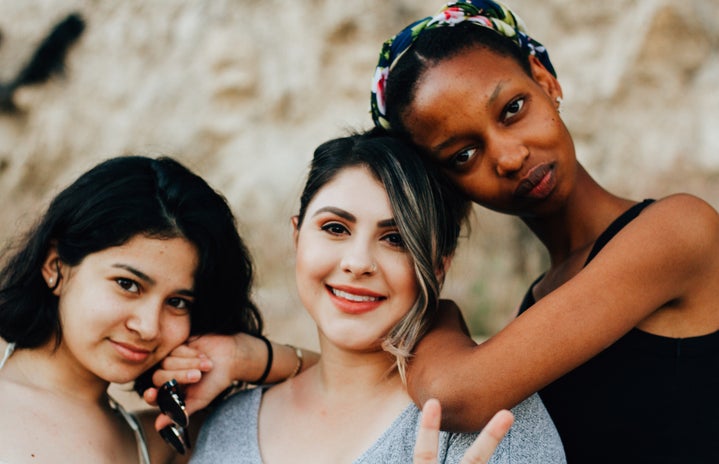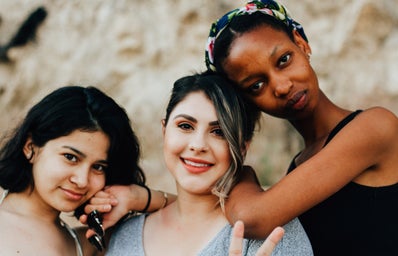“Why did you just say ‘sorry’?”
I didn’t know how to respond to my friend’s question; I had no reason to apologize. Did I apologize out of habit or a sense of obligation? I took this experience to heart and continued to ruminate on her question. Apologizing when necessary is right; the problem is when we apologize habitually and without a clear purpose. Self-flagellation can make us submissive and insecure. Our thoughts become our words, and our words lead to our actions. To mean what we say and say what we mean, learning to be real— both with ourselves and others— is key.
To understand ourselves, making sense of our roots and experiences matters. As someone who grew up in Tokyo, Japan, and on the East Coast in the United States, I learned that what works in one place does not necessarily work in another. In Japan, I had accepted compliments by rejecting them for the sake of politeness. However, this so-called politeness became almost useless in the United States, not because people were rude at my school in the U.S., but because other values carried more weight. In high school in Massachusetts, “authenticity” was one of my school’s four core values. One day, my class took a survey on qualities we cherished in friendships. My friends responded, “being real” while I responded, “respect and sensitivity.” My response reflected how I acted, too. When I visited my friend in New York one family weekend, my friend’s dad said to me, “Make yourself at home.” He then opened the fridge and said, “Help yourself.” Every time I took something from the fridge, I would say, “thank you.” That means every time I took out a cup of yogurt, picked out fruit, and grabbed a bottle of water. My friend’s dad pulled me aside and said, “You don’t have to say ‘thank you’ every time,” to which I responded, “Thank you” and “sorry.” I couldn’t be myself because I was afraid to act out of line. But because I realized that in the United States, if I apologized too much, I could get sued, I decided to change. People can change. I learned to be true to myself. The pursuit of integrity— whether that meant to apologize, express gratitude, or say no— helped me understand who I was and what I stood for. I apologized only when necessary. My actions were intentional. One day, a classmate approached me and said,“I like you more now that you’re sassy.” If sass meant “being real,” I was starting to get it.
Two Japanese words— honne and tatemae— can explain this experience. The former is one’s real intentions— what one actually thinks. In Japan, one could say one thing and mean another. Reading between the lines without twisting the truth is a form of communication. Apologies, too, may be a reflection of this ambiguity. Roger Pulvers of the Japan Times says, “In Japanese, “maybe” means “no” and “yes” means “maybe.” And this brings us to the question, is this euphemism a coverup for people’s natural, often darker, instincts, or just a flowery way to gild a lily?” In Japan, where wa, “harmony,” is integral to its social fabric, apologizing can be a silver bullet. It keeps society together. And in a relationship-oriented society, sometimes apologizing at the expense of principles can help ease tensions and restore harmony.
Apologies can be a form of lip service— a social contract rather than a sincere expression. Instead of apologizing from a place of reflection and honesty, many of us apologize for deflection and convenience. The word sumimasen, which is “excuse me” in Japanese, could mean “sorry,” “thank you,” and “excuse me” all together. Does this word serve a clear purpose? Not necessarily. Human rights activist and writer Debito Arudou wrote in the Japan Times, “Skillful lying is thus commendable — it’s what adults in society learn to do.” Emma Cooke from the BBC writes, “It’s a chicken-and-egg scenario: is this cultural empathy born of morality, or vice versa?” She then acknowledges that this culture may stem from the ‘moral education’ lessons launched in 1958 in Japan, which taught children the importance of “co-operating with others for everyone’s benefit,” and one that the samurais may have originated. This supposedly ancient concept dictates much of Japanese society today, and it’s becoming a problem.
I’m not saying we don’t need manners or shouldn’t apologize when we need to. However, choosing when and how to apologize is to understand our intentions; it’s self-respect. To apologize without a purpose is to lie to and lower ourselves, to admit that we are not worthy of something of which we are. It’s to bend our principles, too, as we compromise, become obsequious, and avoid conversations when we should stand our ground. Apologies can have much deeper implications than the word “sorry.” They are products of our thoughts (or the lack thereof); unintentional apologies can lead to misunderstandings and lies. Self-deprecation and humility are not the same; neither is confidence and arrogance. Ultimately, apologies are about communication. If we don’t ask ourselvs why we say what we say, chances are, we will misunderstand ourselves. If we don’t understand ourselves, who else can understand us?
Learning to be real with ourselves and others is key to saying what we mean and meaning what we say. And in this process, understanding our roots can help us learn about ourselves. People can change. The culture of Honne and tatemae explains this experience. Although having manners and apologizing when necessary are important, apologizing simply from a sense of obligation is insincere. Words reflect our thoughts; what we say and how we say it reveal how we think and who we become. Some of us don’t apologize enough. Some of us apologize too much. Apologies should come from a place of honesty, which first requires us to be true to ourselves. I’m sorry for being apologetic, because from now on, I’m sorry, not sorry.


